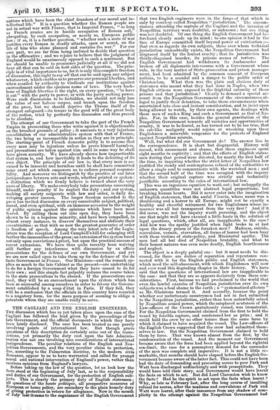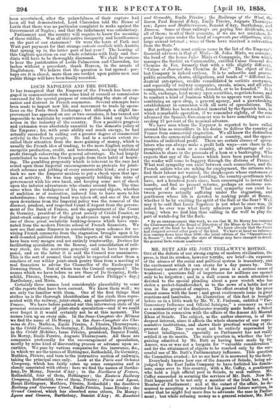THE CAGLIARI AND THE ENGLISH ENGINEERS. THE discussion which has
as yet taken place upon the case of the Cagliari has followed the lead given by the proceedings of the late Government, and the official documents in which they have been lately disclosed. The case has been treated as one purely involving points of international law. But though grave questions of this description do certainly arise out of the trans- actions, yet primarily the duty cast upon the late Adminis- tration was not one involving nice considerations of international jurisprudence. The peculiar relations of the English and Nea- politan Governments, and the very peculiar claim to protection, due, according to the Palmerston doctrine, to the modern civis Romanus, appear to us to have warranted and called for prompt moral and national intervention of England's power, rather than cautious opinions from England's lawyers.
Before taking up the law of the question, let us look how the facts stood at the beginning of July last, as to the responsibility and duties of our Government, for the protection of English sub- jects. This is clearly the primary duty of English statesmen ; all questions of the haute politique, all prospective measures of European or home policy, are secondary to the plain homely duty of gyring protection in return for allegiance. Now in the month of July last it came to the cognizance of the English Government
that two English engineers were in the fangs of that which is only by courtesy called Neapolitan "jurisdiction." The circum- stances attending the capture of the Cagliari and the invasion of Neapolitan territory were doubtful, or unknown ; but one thing was not doubtful. Of one thing the English Government had be- forehand clearly made up its mind ; to one opinion it had in the face of Europe committed itself beyond power of extrication ;— that even as regards its own subjects, those over whom technical jurisdiction undoubtedly, exists, the Neapolitan Government had disgraced itself by the foulest cruelty ; that its jurisdiction was thinly-disguised murder, its prisons scenes of torture. The Enghsh Government had withdrawn its Ambassador and broken off all diplomatic intercourse with a Government whose rule, in the very matter of State-prosecution and prison manage- ment, had been admitted by the common consent of European nations, to be a scandal and a danger to the public order of Christendom. What then was the plain and obvious duty of statesmen who meant what they had done in Naples, when two English citizens were exposed to the frightful calamity of those prisons and that jurisdiction ? Clearly to demand a special ac- count from the Neapolitan Government of the circumstances al- leged to justify their detention, to take those circumstances when ascertained into close and instant consideration, and to insist upon being allowed to watch, by their own agents, the dealings with these men of such a Sing and such a Government as that of Na- ples. For, in this case, besides the general gravitation of the Neapolitan Government towards all varieties and opportunities of cruelty, it was to be feared, as has turned out to be too true, that its cat-like malignity would rejoice at wreaking upon these Englishmen a miserable vengeance for the protests of England against Neapolitan misrule.
Well, but what did our Government do ? The answer lies in the correspondence. It is short but disgraceful. History will record, with amazement and shame, that these engineers spent eight months in captivity ; and that the efforts of English states- men during that period were directed, for nearly the first half of the time, to inquiring whether the strict letter of Neapolitan law justified the steady and contemptuous refusal of the authorities to allow a single soul to communicate with the wretched men ; and that the second half of the time was occupied with the inquiry whether their original capture was strictly and technically justifiable according to the rules of international law. This was an ingenious equation to workout; but unhappily the unknown quantities were not abstract legal propositions, but breaking human hearts. Did it never enter into the imagination of English statesmen, that the awful Vicaria, whose name was a shuddering and a horror to all Europe, might not be exactly a healthy and cheerful retirement for two Englishmen whose in- nocence was all but transparent from the very first ? And if it did occur, was not the inquiry worth pursuing, and the object one that might well have excused a little haste in the solution of legal questions, which, after all, are inapplicable to the case? And how was the apathy justified when light broke in at last upon the dreary prison of the forsaken men ? Madness, suicide, convulsion, vermin, starvation, all forms of horror had been busy with these victims of state-policy, and Ministerial apathy. The men had all but died of Neapolitan brutality, and what to their honest natures was even more deadly, English heartlessness and neglect. • The object is a deeply painful one : but it must needs be dis- cussed, for there are duties of reparation and repentance con- nected with it for the English public and English statesmen, which need the self-abasement, with which Englishmen will now and ever read this degrading chapter in their history. We have said that the questions of international law are inapplicable to the case : and that they are so appears decisively from these con- siderations. First, because we had proclaimed to the world that even the lawful exercise of Neapolitan jurisdiction over its own subjects was a foul shame to the earth ; a "systematized atheism" as Mr. Gladstone termed it. And secondly, because the point whether our unfortunate countrymen had not in fact submitted to the Neapolitan jurisdiction, rather than been unlawfully seized by Neapolitan armed power, which the misplaced acuteness of the Law-officers of the Crown gratuitously raised, was immaterial. For the Neapolitan Government claimed from the first to hold the vessel by forcible capture, and condemned her as prize ; and it
chuld hold the crew by no other tenure than the same farce by which it claimed to have acquired the vessel. The Law-officers of
the English Crown suggested that the crew had submitted them- selves to law. But the Neapolitan Government claimed to hold them by force. That was known almost from the first, by the condemnation of the vessel. And the moment our Government became aware that the force had been applied beyond the rightful
sea-limit, the case for a peremptory, demand for the surrender
of the men was complete and imperative. It is not a little re- markable, that months should have elapsed before the English Go- vernment became aware of the latter fact. This could not have been had the duty of demanding and procuring access to poor Park and Watt been discharged unflinchingly and with promptitude. They would have told their story, and Government would have learnt the facts on which to act. But did Lord Clarendon wish to know the facts ? Had he the spirit to act upon the facts when learnt ? Why, so late as February last, after the long course of insulting refusal for access, after the madness and convulsions of Park and Watt were learnt, after their innocence from any shadow of com- plicity in the attempt against the Neapolitan Government had been ascertained, after the unlawfulness of their capture had been all but demonstrated, Lord Clarendon told the House of Lords that there was no particular complaint to make against the Government of Naples ; and that the indictment was satisfactory.
Parliament and the country will require to know the meaning of these riddles. Was all this native incapacity and heartlessness on the part of our statesmen? Or were the tears of Park and Watt part payment for that strange entente cordiale with Austria that sprang up in the latter part of last year? The bearing of this Cagliari question on our whole relations with Italy and Sar- dinia will have to be thoroughly discussed. We shall be curious to hear the justification of Lords Palmerston and Clarendon, for laches without a precedent, thank Heaven, in the annals of Englishmen. We believe that the question is but opened: per- haps ere it is closed, more than one verdict upon public men and public things will have been finally recorded.



























 Previous page
Previous page